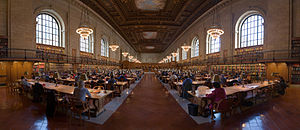 Image via Wikipedia
Image via WikipediaFirst of all, here’s an American Debate Semifinal for you to have a look at. Lots of reliance on cited sources and files in this format, you might notice. Deep research is the key to doing well in these debates.
When I was a high school debate coach, I made sure to always have an excellent and close relationship with the librarians. It was essential. The librarians would become staunch allies once they saw the research and writing skills that policy debate developed in students. When students started spending more time at the library before and after school searching for “evidence,” then the librarians had no choice but to fall in love with debate. Near the end of my tenure in that position, the librarians would ask me about the upcoming topic for the next year – they wanted to use their resources to buy essential books and other resources for the coming competitive year.
When I moved to University coaching, I found the same thing – a close relationship with the library was essential. It was beyond question that you seek out your allied librarian to help you find unusual books and articles on the annual topic. That process of discovery was really fun.
I do miss it, although I am enjoying exploring the fairly new territory (at least in the US) of WUDC debating. Of course, the librarians still know me well, but it’s mostly for my personal or professional research interests, not for the debate topic, per se. I do keep the campus news pipeline full of information about what we are doing in debate, but I think they feel a bit left out. From time to time they ask me, “What’s the library’s role in all this?” The American assumption is that one collects lots of information, processes it, assembles a case, and then goes to debate (see the film The Great Debaters for an example of how entrenched this is). The reason is that American debating has always been a practice modeled on adversarial decision-making (as opposed to creative or cooperative argumentation). In WUDC format, the process is different – and sometimes can be the opposite – you go seek out information after debating something because, well bluntly, you did a terrible job in putting a relevant case together. We perform some research in a general sense on various topics that we think may come up in a debate. But that research is quite different from what I used to do as a policy coach.
This article made me think that perhaps the change is in both directions. The contemporary University Library is becoming more of an information literacy center rather than a place to discover (or uncover) the dusty tomes of fact to bolster your belief. It seems, at least from the tone of the article, that the library at most Universities is transforming itself into a place that serves in the formation of belief and opinion via information processing – one of the ways debate is valuable as a pedagogical activity as well.
This tone circulates around re-appropriation of space, resources, personnel and more. It seems to graft onto, almost directly, the recent trend in the United States of “paperless debating” – debating from a laptop instead of paper files. Still a long way off from being universal, I think, but it’s coming. I think the library is moving this way too. Whatever the previous relationship with your library, you stand to gain something from being involved in an official capacity as a debater. Whatever new resources you might need or want for your debating experience, it seems now is the time to develop, or re-develop, that library relationship.
Policy debate and WUDC debate, the two formats I’m most familiar with, are also facing the stimulus that is behind these changes for the library. Perhaps you and your club should take stock of your relationship to the library and how familiarity at a time of great change can improve both of these vital parts of your University.
